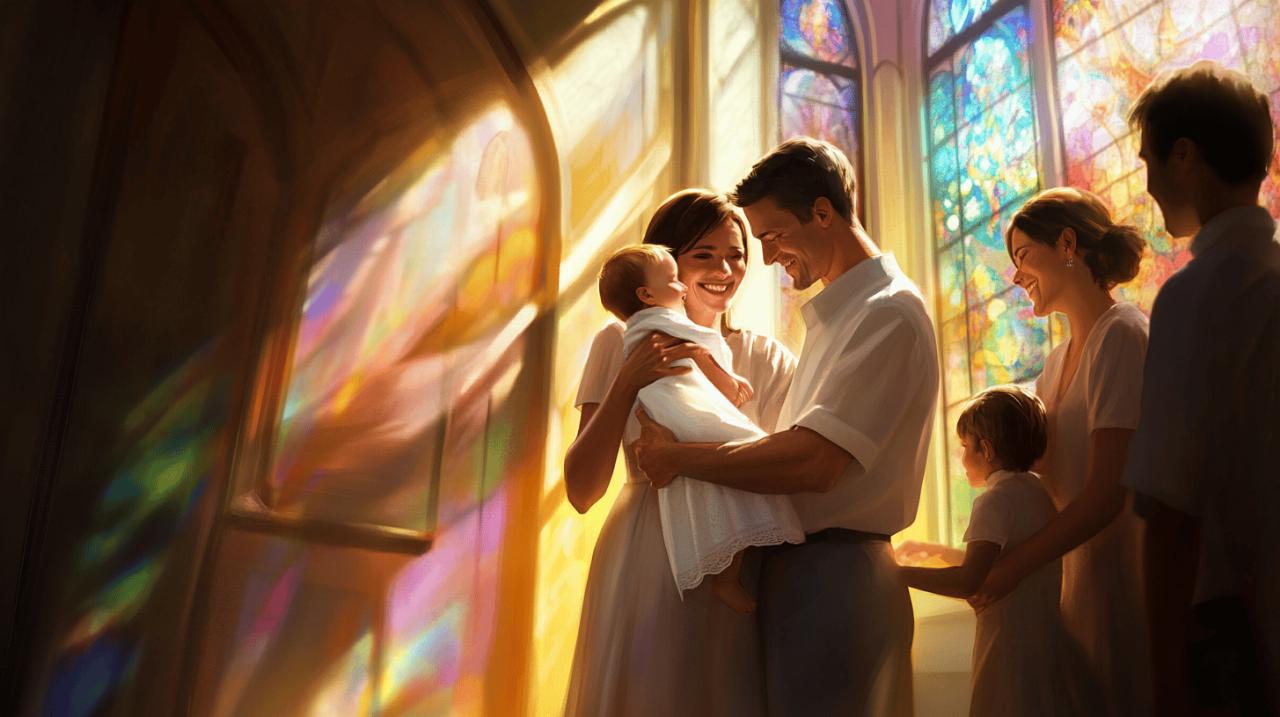Choosing the Perfect Spiritual Guide: Quel est le role du parrain pour le bapteme?
The journey of faith begins with significant moments, and baptism stands as one of the most sacred ceremonies within the Catholic tradition. This sacrament not only welcomes a child into the Christian community but establishes spiritual connections that are meant to last a lifetime. Among these connections, the role of the godfather holds particular importance, serving as a guide for the child's developing faith journey.
The Sacred Role of a Godfather in Baptism
When parents choose a godfather for their child's baptism, they're not simply selecting someone to attend a ceremony—they're appointing a spiritual mentor who will play a crucial role in nurturing their child's relationship with the Catholic Church. The godfather, alongside the godmother, represents the wider Christian community and serves as a witness to the child's initiation into the faith.
Historical significance and traditions
The tradition of godparents dates back centuries in Christian practice, evolving from the early Church when adult converts needed sponsors to vouch for their sincerity and support them in their new faith. Over time, as infant baptism became common practice, the role shifted toward spiritual guidance for children. In French tradition, the godfather or 'parrain' has always held a place of honour, representing masculine virtues and guidance that complement the nurturing qualities of the godmother. Within the Diocese of Nanterre and throughout Catholic parishes across France, this tradition remains strong, with godparents expected to be practising Catholics who have received the sacraments of baptism and confirmation themselves.
Responsibilities during the ceremony
During the baptismal ceremony, the godfather takes on several meaningful responsibilities. He stands beside the parents and publicly affirms his faith and willingness to support the child's spiritual development. One of the most symbolic moments occurs when the godfather lights the baptismal candle, representing Christ as the light of the world and the illumination of faith in the child's life. The godfather also signs the baptismal registry, officially documenting his commitment. According to Catholic traditions, the godfather typically presents the child with a religious gift, often a chain to complement the medal frequently given by the godmother, creating a lasting physical reminder of the spiritual bond formed on this day.
Spiritual guidance and faith formation
The significance of a godfather extends far beyond the baptism ceremony itself. The Catholic Church views this role as a genuine commitment to supporting the child's development within the Christian faith, requiring godparents to be at least 16 years old and to have received their own sacraments of initiation.
Nurturing the child's faith journey
A godfather's primary spiritual responsibility is to serve as a model of Christian living for his godchild. This means demonstrating the values and practices of the faith through his own life. He helps the child understand Church teachings and the significance of sacraments like Reconciliation, Holy Communion, and eventually Confirmation. The godfather might accompany his godchild to church services, discuss aspects of religious education, and celebrate Christian festivals together. This ongoing presence provides the child with a trusted guide outside the immediate family who can offer perspective and wisdom on matters of faith.
Supporting parents in religious education
Godparents also serve as valuable allies to the parents in their efforts to raise the child within the Church community. When parents face questions or challenges regarding religious upbringing, a godfather can offer support, resources, and sometimes a different perspective that enriches the child's understanding. In some parishes, godparents are invited to participate in catechism activities or religious education programmes alongside their godchildren, reinforcing the teachings the child receives. This partnership between parents and godparents creates a stronger foundation for the child's spiritual development and demonstrates the communal nature of faith formation within the Catholic tradition.
Building a lasting connection beyond baptism
While the ceremonial aspects of being a godfather conclude with the baptism, the relationship itself is meant to flourish throughout the godchild's life, forming a special bond that complements the parent-child relationship without replacing it.
Creating meaningful bonds through life milestones
Effective godfathers remain present for significant moments in their godchildren's lives, particularly those related to faith development. When the child receives First Communion, celebrates Confirmation, or faces important life decisions, the godfather offers guidance shaped by Christian values. Beyond religious milestones, many godfathers develop meaningful personal relationships with their godchildren, celebrating birthdays, achievements, and holidays together. This consistent presence helps children understand that their spiritual community extends beyond Sunday services and provides them with another trusted adult who cares about their wellbeing and development.
Practical Ways to Fulfil the Godfather's Role
Modern godfathers can fulfil their spiritual responsibilities in numerous practical ways. Regular communication, even if distance separates them from their godchildren, helps maintain the connection. Many godfathers establish traditions of sending cards for religious holidays, sharing religious books or items that mark spiritual growth, or simply spending quality time together. Some godfathers make a practice of praying for their godchildren regularly and letting them know they are held in prayer. These efforts need not be elaborate—consistency and sincerity matter more than grandeur. Religious jewellery, such as crosses or medals featuring saints, often serve as tangible reminders of the godfather's ongoing presence and support, with many Catholic traditions suggesting these as appropriate gifts for various milestones.
Modern Interpretations of the Godfather's Role
While the essential spiritual purpose of the godfather remains constant, contemporary families and communities have adapted certain aspects of the tradition to fit modern circumstances while preserving its core meaning.
Cultural and religious variations
The interpretation of the godfather's role can vary significantly across different cultural contexts, even within the Catholic Church. Some communities emphasise the social responsibilities of godparents, with expectations that they will provide material support or educational guidance alongside spiritual mentorship. In some French families, there is a growing interest in civil baptism, a non-religious alternative that emerged during the French Revolution and continues today. This ceremony maintains the concept of adult mentors for children but removes the religious elements. However, it's important to note that the Catholic Church distinguishes between these traditions, specifying that someone who has only participated in civil baptism would need religious training before serving as a Catholic godparent.
Adapting traditions for contemporary families
Today's families often face practical challenges in fulfilling traditional godparent roles. Geographic distance, diverse family structures, and varying levels of religious practice all influence how the godfather-godchild relationship develops. Many parish communities now offer resources and support for godparents who may feel uncertain about their responsibilities or how to fulfil them in the modern world. The Diocese of Nanterre, like many dioceses, provides guidance to help godparents understand the significance of their role and practical ways to live it out. Some parishes have developed godparent preparation programmes similar to baptismal preparation for parents, ensuring that those who take on this important role fully understand its spiritual significance and practical implications. Despite these adaptations, the fundamental purpose remains unchanged: to provide children with spiritual guides who help them grow in their faith and develop a personal relationship with the Christian community.
Catholic church requirements for godfathers
The sacred role of a godfather in Catholic baptism embodies a profound commitment to guide a child's spiritual journey. Within the Catholic tradition, godfathers serve as faith witnesses and representatives of the wider church community, actively supporting both the child and parents in nurturing Christian values and religious education.
The Catholic Church establishes specific criteria for godparents to ensure they can fulfil their spiritual responsibilities properly. According to church guidelines, godparents must be practising Catholics who have received the sacraments of Baptism, Confirmation, and Holy Communion. They should be at least 16 years old and must not be the child's parents.
During the baptismal ceremony, godfathers make solemn promises regarding their own faith and commitment to support the child's Christian upbringing. These promises reflect the serious nature of this religious role, which extends far beyond the baptism day itself into a lifelong relationship of spiritual mentorship.
Eligibility Criteria in the Diocese of Nanterre
The Diocese of Nanterre, like other Catholic dioceses, maintains clear guidelines regarding godparent eligibility. In this diocese, a godfather must be a baptised and confirmed Catholic who actively practises the faith. The minimum age requirement is typically 16 years, though exceptions might be considered with proper approval from clergy.
Non-Catholics cannot serve as official godparents within the Diocese of Nanterre, though they may participate as Christian witnesses to the baptism if they are baptised members of another Christian denomination. This distinction preserves the Catholic nature of the sacrament while respecting ecumenical relationships.
The diocese emphasises that godparents should be selected based on their authentic faith commitment rather than family obligations or social connections. This reflects the Church's desire for godparents to be genuine spiritual guides rather than merely ceremonial figures. Once a godfather has been registered and participated in the baptism, this spiritual relationship is considered permanent in the Catholic tradition.
Sacramental preparation for godparents
Prospective godfathers in the Diocese of Nanterre are typically expected to participate in preparation sessions to better understand their spiritual responsibilities. These sessions explore the theology of baptism, the specific duties of godparents, and practical ways to support the child's faith development throughout their life.
During the baptismal rite itself, the godfather takes an active role alongside the godmother. Traditionally, whilst the godmother might hold the child during the actual baptism, the godfather often has the honour of lighting the baptismal candle, symbolising Christ as the light of the world. Both godparents sign the parish baptismal registry as official witnesses to the sacrament.
Beyond the ceremony, the godfather's role involves ongoing support through significant religious milestones such as First Holy Communion and Confirmation. Many godfathers maintain Catholic traditions by gifting religious medals or other symbols of faith to their godchildren, particularly a chain or cross, which serves as a tangible reminder of both the sacrament and the special relationship between godparent and godchild.
